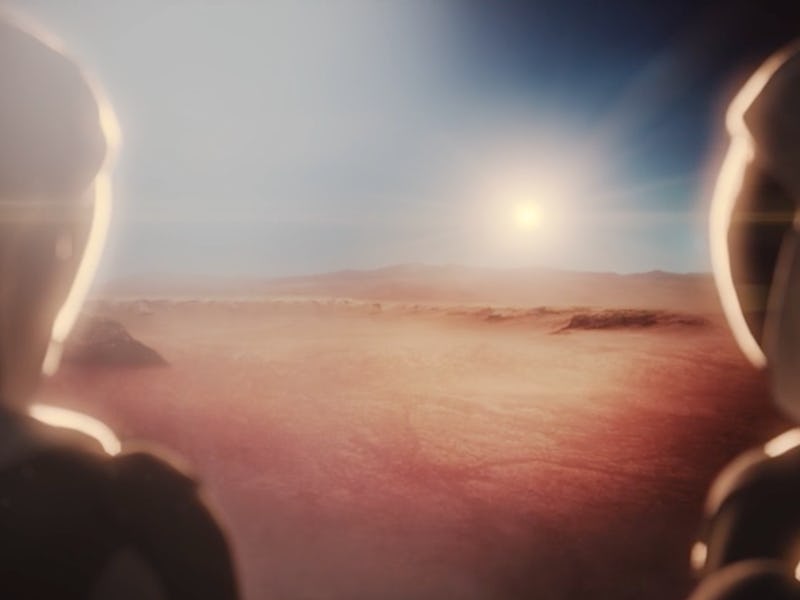
Between the dust storms, thin atmosphere, and frigid temperatures, future Mars colonists are going to have it rough. But they won’t even get a chance to battle the Martian elements unless we figure out a way to supply them with life-giving oxygen. It may seem impossible to do so organically on the barren red planet, but a new Science paper suggests a single Earth organism might be able to do the trick.
In the paper, published Thursday, an international team of researchers report that cyanobacteria, a huge family of tiny organisms that thrive in extreme environments, show promise as oxygen sources for future Mars colonists. Because they are photosynthetic, cyanobacteria thrive on carbon dioxide and energy from the sun, burping up oxygen as a byproduct — just like plants. They’re the ideal fresh air source for Mars, as long as they don’t demand too much sunlight.
“This might sound like science fiction, but space agencies and private companies around the world are actively trying to turn this aspiration into reality in the not-too-distant future,” said study co-author and Australian National University Emeritus Professor Elmars Krausz, Ph.D., in a statement published Wednesday.
“Photosynthesis could theoretically be harnessed with these types of organisms to create air for humans to breathe on Mars. Low-light adapted organisms, such as the cyanobacteria we’ve been studying, can grow under rocks and potentially survive the harsh conditions on the red planet.”
Photosynthetic cyanobacteria, like this mat seen at Yellowstone National Park, may some day provide oxygen for Mars colonists.
Cyanobacteria, one of the largest groups of bacteria on Earth, have existed for over 2.5 billion years in some of its harshest environments: Antarctica, the Mojave Desert, the scalding hot springs of Yellowstone National Park, and, notably, even in the deepest sea. It was the varieties who make their home in the dark that most intrigued the ANU team as they are inherently well equipped to deal with a lack of sunlight. There’s sunlight on Mars, but it’s not nearly as abundant as it is on Earth, which is, at its closest, 33.9 million miles farther away from the sun than we are. If we want to carpet Mars with cyanobacteria, they’d better be able to deal with low light.
So, the team set to work trying to understand what makes those deep-sea cyanobacteria able to photosynthesize in such low light conditions. Chlorophyll, you might remember from elementary school, is the key chemical that converts light to energy in photosynthetic organisms. The low-light cyanobacteria, it turns out, have a special type of chlorophyll that’s adapted to low-energy light.
“Chlorophyll adapted to absorb visible light is very important in photosynthesis for most plants, but our research identifies the so-called ‘red’ chlorophylls as critical components in photosynthesis in low-light conditions,” said co-author Jennifer Morton of the ANU Research School of Chemistry in a statement, referring to chlorophylls that absorb light at the far-red end of the electromagnetic spectrum, around 750 nm. Cyanobacteria that receive normal amounts of light usually absorb red light, which has a wavelength of about 680 to 700 nm.
Though the far-red light absorbed by deep-sea cyanobacteria has less energy than red light, it can still carry out the process of photosynthesis without a hitch.
“Understanding the red-limit is also of interest to astrobiology as oxygenic photosynthesis is considered a signature for complex life and many otherwise potentially life-bearing planets are poor in visible light but rich in far-red/near infra-red light,” the team writes.
A cyanobacteria bloom can be seen flooding the ocean in this photo taken near Fiji.
As Krausz said, the idea that a bunch of cyanobacteria could fill the entirety of Mars with breathable air seems completely fantastical — until you realize that that’s exactly what they did for Earth. In 2017, a Science study showed that life on Earth didn’t emerge until the first oxygen-producing cyanobacteria evolved 2.5 billion years ago. “Cyanobacteria are really special from a planetary perspective, because they’re the ones that figured out how to do the photosynthesis everyone knows and loves,” the paper’s co-author, Woodward Fischer, Ph.D., told Inverse in a previous interview. “Everything we breathe, we owe in some way to these guys. That they figured out photosynthesis relatively recent in their history … we didn’t necessarily expect that. That’s a big deal.”
After this study, whether Mars colonists will be saying the same thing in the near future seems increasingly likely.